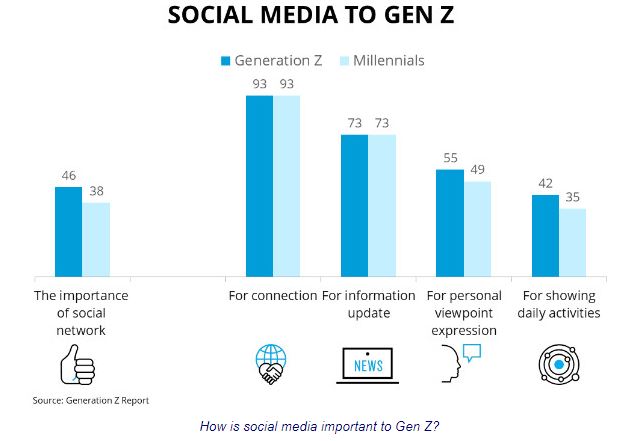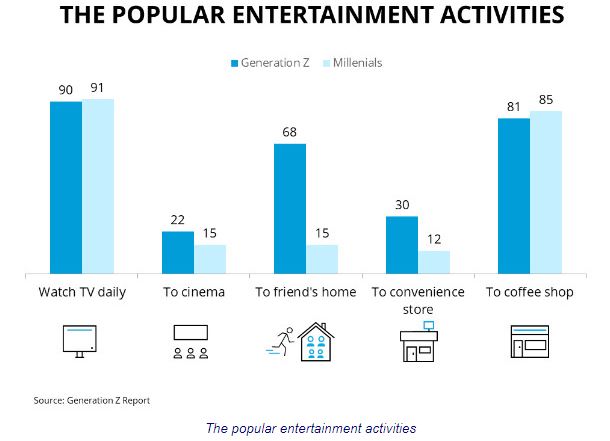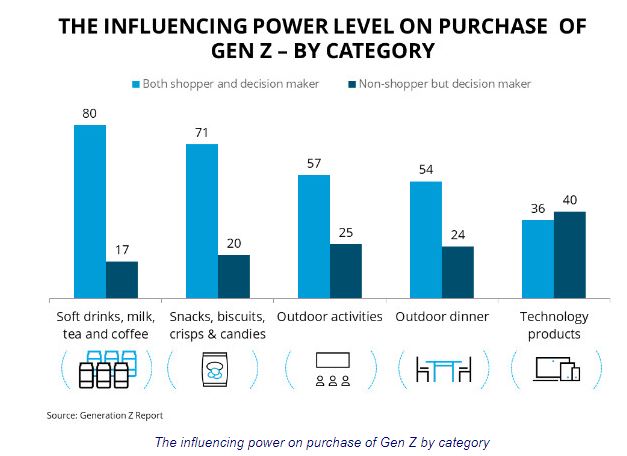Generation Z leave marked impact on Vietnam’s consumer landscape: Nielsen
Generation Z, born between 1996 and 2005, is already having a marked impact on the consumer landscape in Vietnam given their growing purchasing power while they are years from fully establishing themselves, according to the latest report “Generation Z in Vietnam” released by Nielsen – a global information and measurement company.
Generation Z is estimated to be around 15 million people by 2025, representing approximately 25% of the country’s workforce.
Up to 70% of Generation Z correspondents said that they would influence the purchase decisions for furniture, household goods, indulgent food and beverage. According to Retail Measurement Service data, indulgent food and beverage have the market size of US$6.6 billion in 2017. And their influencing power on purchase is not just limited to these categories above.
They indicated that they were the key decision makers for outdoor entertainment activities, outdoor dining activities or technology gadgets such as smartphones, tablets, laptops and smart watch. It is clearly that Generation Z has a significant impact on the consumer market in general and on some categories in particular.
“It cannot be denied that today’s children have a remarkable influence on adults’ purchase decisions. These youngsters can observe, demand and select goods with permission while shopping with their parents or when shopping on their own. The rise of dual-income households in Vietnam has empowered these young people a big way so that they can participate more in the decision-making process of the family from an early age,” said Nguyen Huong Quynh, managing director of Nielsen Vietnam.
The report highlighted that social media becomes an essential part of their lives, the same as traditional media forms like television.
Like Millennials, which were bond between 1988 and 1995, Generation Z spends a significant amount of time on social media sites and video sources platforms such as Instagram, Facebook and YouTube.
However, the approach is more multifaceted. 99% of Gen Z respondents have Facebook accounts, 77% have Zalo accounts and the figure is 64% for YouTube. Yet, 90% of Generation Z respondents say they watch television every day within the last one month.
Generation Z is fully immersed in both their digital and physical lives. Having grown up amid the time of booming information and media fragmentation, mobile phones (45%) and Internet (21%) are things that they cannot live without. As social media becomes an essential part of their lives, they use these platforms for various purposes such as connecting with friends and family (93%) and updating what’s going on (73%).


“These traits show that Generation Z is approaching and interacting with brands via various channels or at different touch-points. Therefore, when engaging with this generation, the multi-channels approach is the most ideal and appropriate way to do. Businesses should not just pay attention to online/digital platforms and overlook traditional media and brick-and-mortar stores. Getting the right message via the right platform at the right time is utmost important,” Quynh suggested.
The report also pointed out that Generation Z is less loyal towards a brand and open to new experiences. Nearly four out of ten Generation Z respondents in the study said they were open to interesting trials even they had frequently used brands. Only a quarter of this demographic said that they would consider a brand carefully before purchasing and were unlikely to switch the brand.
The survey polled 370 people in Hanoi and Ho Chi Minh City, with 210 of them being Gen Z and 160 of them Millennials.


 Thailand
Thailand




